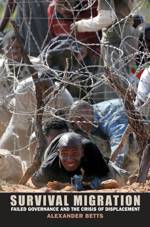Survival Migration starts out by noting that the primary cause of cross-border displacement has shifted from persecution to deprivation. This shift in causation makes the 1951 Refugee Convention increasingly inapt and consequently produces a shift in protection regime, from precision and consistency to imprecision and inconsistency. State responses to people fleeing serious human rights deprivations vary tremendously: in some cases, the migrants are protected as though they were refugees; in other cases they are rounded up, detained and deported. Explaining this inconsistency is the objective of Betts’ analysis. He argues that in the absence of legal precision, protection regimes are shaped by how interests and incentives play out for elites within host state governments.
The book is situated at the intersection of two substantive themes. First, it examines the rise of cross-border migration that is motivated by fear, dispossession and desperation, but nevertheless falls outside the framework of the 1951 Refugee Convention. Betts coins the term ‘survival migration’ to refer to ‘people who are outside their country of origin because of an existential threat for which they have no access to a domestic remedy or resolution’ (pp. 4–5). This concept is a valuable contribution that analytically separates the dynamics of displacement from the regime that governs it, and simultaneously avoids making assumptions about migrants’ (lack of) agency, like the increasingly discredited notion of ‘forced migration’ does.
The second substantive theme of the book is the national politics of international institutions. Along with other scholars in the same tradition, Betts argues that in order to understand how international institutions work, we must not look only to Geneva or New York, but take a bottom-up perspective that is sensitive to particular national contexts. This aspect of the book makes it relevant to the study of African politics more generally, beyond the specific field of migration governance.
The empirical analysis makes use of six paired cases of displacement: Zimbabweans in South Africa and Botswana, Congolese in Angola and Tanzania, and Somalis in Kenya and Yemen. In each of the cases, Betts examines the patterns and causes of displacement, the government responses and the role of the international community. He then seeks to explain the particular responses with reference to interests and incentives. Methodologically, Betts is influenced by what he calls an ‘embryonic ethnographic turn’ in the study of world politics; he seeks to combine the traditional comparative, multi-case approach of international relations scholars with in-depth knowledge gained through fieldwork.
Survival Migration is a well-argued, streamlined and cohesive book; its readership can nevertheless be diverse: scholars of international migration and humanitarianism, students of South African, Botswanan, Angolan, Tanzanian and Kenyan politics, and analysts of international institutions in Africa will all benefit from this insightful and meticulous work.







